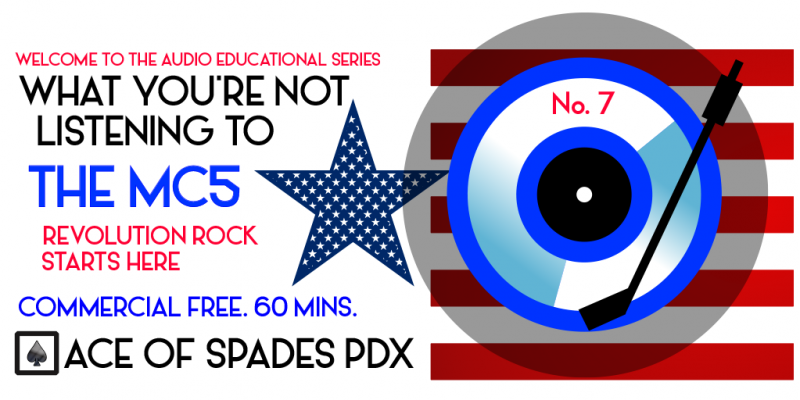Podcast: Play in new window | Download | Embed
NOTE: The first song in this program features the “F” word. Loudly. Not editing this by simply letting history stand on its own.
In honor of Independence Day, a day that kick started the American Revolution, is another story about a revolution. We are featuring a group of musicians that, in essence, are the last great untold story of the 1960’s: The MC5.
MC is for Motor City, Detroit Michigan, but the band actually was founded in Ann Arbor by guitarists “Brother” Wayne Kramer and Fred “Sonic” Smith. Playing a type of super powered, high volume R&B infused with garage rock and free jazz, the band originally were not known for their hallmark political stance. That developed after 1965 as the band’s manager, John Sinclair, founded the radical leftist group the White Panthers.

The band infamously played for protestors at the 1968 Democratic National Convention in Chicago, where they were the only music act scheduled to perform that actually showed up. Things quickly turned sour when the crowd, hassled by the police at every turn, decided to fight back.
Of course, none of this would have meant anything if the band couldn’t deliver. Their shows were considered some of the most electrifying of the decade, even putting acts they were opening for to shame, including Cream and Big Brother and the Holding Company featuring Janis Joplin. The band, now also featuring vocalist Rob Tyner, bassist Michael Davis and drummer Dennis Thompson, had created a new type of sound that there simply wasn’t words for.
The band released several local singles to good sales and in 1969, their debut LP, Kick Out The Jams, made the top 30 on the national Billboard chart, an amazing feat considering it was a live recording and famously featured the F word. Further controversy would dog the band throughout the year, resulting in them being dropped by Elektra Records after just this on LP and being picked up by Atlantic.
“We were Punk before Punk. We were New Wave before New Wave. We were Metal before Metal. We were even M.C. before Hammer.”
Rob Tyner, lead singer of the MC5, 1991
Back in the USA followed. Sadly, Atlantic didn’t know what to do with them, either. The band’s momentum floundered, and within a year, their 1971 LP High Time didn’t even chart. They would go on to record several tracks for a independent film soundtrack in 1972, Gold, but hard drugs being done by the band members, political empathy on the part of the public and incarceration spelled the end of the MC5’s relevance at the time.
Rob Tyner, who eventually became a photographer, died in 1991 of a heart attack, shortly before the release of Kick Out the Jams on CD for the first time. Michael Davis, after a stint in prison, formed the band Destroy all Monsters with Ron Asheton of The Stooges, became a painter and died in 2012 of liver failure. Fred Smith formed the Sonic Rendezvous Band, married punk poet Patti Smith, retired from regular performing and recording and died in 1994 of heart failure. Dennis Thompson played in a reformed MC5 line-up for a while but has since retired from music.
Wayne Kramer did time in prison and got clean from drugs. Last year, Kramer (founder of a non-profit that helps people in prisons) went on a short tour with guest players to remind everyone that the MC5 were a band that needed to be remembered and celebrated in the best way possible: loudly.
First Part
- Kick Out The Jams (live), 1972, “Beat Club” TV program, Germany (different version on Kick Out The Jams)
- Looking At You, 1968, single A-side (on A Squared Records)
- The Human Being Lawnmower, 1970, Back In The USA
- Baby Won’t Ya, 1971, High Time
- One Of The Guys, 1967, single A-side (on AMG Records)
- Thunder Express (live), 1972 bootleg (eventually officially released on The Big Bang on Rhino Records)
Second Part
- Shaking Street, 1970, original demo, eventually appeared in a different mix on Back In The USA
- Gold, 1972, original soundtrack recording
- Poison, 1971, High Time
- Rocket Reducer No. 62 (Rama Lama Fa Fa Fa), 1969, recorded at Sturgis Armory, Michigan (different version on Kick Out The Jams)
- American Ruse, 1970, original demo, eventually appeared in a different mix on Back In The USA
- Over and Over, 1971, High Time
Finale
- Black To Comm (live), 1965, basement recording at the Kramer home, Ann Arbor, Michigan
Love to you all.
Ben “Bear” Brown Jr.
Host, Producer, Audio Engineer and Writer
“Copyright Disclaimer Under Section 107 of the Copyright Act 1976, allowance is made for ‘fair use’ for purposes such as criticism, comment, news reporting, teaching, scholarship, and research. Fair use is a use permitted by copyright statute that might otherwise be infringing. Non-profit, educational or personal use tips the balance in favor of fair use.”
